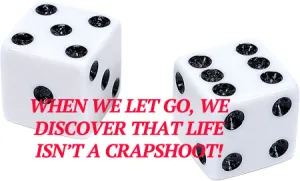Judgment
Last week, I wrote about my sadness that people are often considered to be badly created or badly raised. As I mentioned, I don’t think it’s that uncommon for people to think of others in that way. However, in America, we wouldn’t dare say what we’re thinking. We’d cover it up with a nice mask. Americans are excellent, silent projectors of judgment. This is an update on those earlier stories and a testimony to how things can change when you let go.
I’d often felt others judge me as badly created or badly raised only because I was different. I didn’t share their beliefs or see through the same lens. So I went back to many of those times, brought up the emotions that I repressed because I didn’t know how to let go at the time, and witnessed the emotions realizing that the person’s judgment (belief) wasn’t the truth. They weren’t really judging me; they were judging their own projection. But when I didn’t know that, I stored the painful memory in my body. I did that process until I couldn’t think of anymore examples. I just felt peace and love. Then I completely forgot about it. Until a few days later…
Illusion Confusion
I went to a festival in the center city here in Cuenca (above photo). Lots of people were dancing in the streets to very good live music. A man came up to me and held out his hand. He was an older Ecuadorian man — dirty and very drunk. At first I thought he wanted money, but his hand was turned with the palm down. I knew enough Spanish to realize he wasn’t talking about money. He wanted to dance. I politely said “No,” but he wouldn’t leave me alone. I realized that I didn’t say “No” with enough force. American politeness is often too soft here. So I said, “No, gracias!” (No, thank you) in a slightly louder voice; but still he tried to convince me to dance with him.
Just then a young man, who was leaning on a nearby fence, walked over and very gently held the man by the elbow and explained to him kindly that I didn’t want to dance. He walked him away from me and then went back to his place on the fence. There was no force, no anger — just caring and kindness. My mind flashed to earlier images in my life of bouncers beating up drunk men or policemen pushing and yelling at people as they demonstrated their authority.
I realized that the young man didn’t see the old drunk man as badly created or badly raised; he saw him as confused. That was how he spoke to him — like he was teaching him rather than punishing him. He saw him as not knowing the proper way to relate to someone outside of his own culture. I walked over to the young man and said, “Muchas gracias,” (Thank you very much) and smiled. He smiled back and nodded.
No Judgment, No Force
I still can’t think about that interaction without getting tears in my eyes. I realized that the reason we use authority and force to handle things is because of judgment. Authorities see themselves as right and superior; the offender is obviously wrong and inferior. When judgment isn’t present, no force is needed. It’s all so simple.
Judgment will always be present, even if unstated, if we believe that other humans can be badly raised or badly created. Thus, if we believe in the notion of original sin or believe that humans fell from grace, then we can’t help but have judgment for others.
I realized how lucky I was not to have those beliefs installed in my mind as a child. Before I married, I didn’t know what judgment was. It was a word that I couldn’t comprehend. Occasionally, I attended Catholic church with my husband and his family. I realized that my mind started to judge others at that time. I didn’t like it, and I wondered where the thoughts were coming from. I felt it was from the church because I noticed that people seemed very judgmental after they attended mass. But I kept dismissing my observation because it seemed ridiculous that our mind would become more confused, negative, and hateful after attending what was supposed to be something good and spiritual.
Religions all evolved from the idea that humans are flawed and need spiritual training. The notion of initiation, on the other hand, is based on the idea that we are good and spiritual by nature. That goodness can’t be destroyed; it can only be covered with beliefs, creating confusion. Even the worst human isn’t evil in the initiate’s eyes; they just have a thicker layer of illusion covering their True Self.
This isn’t only a lesson in how to treat others. It’s a lesson in how to treat ourselves. If we view ourselves as flawed and needing fixing, we’ll hold on to beliefs in problems, suffering, and punishment. We’ll try to use our will to jump over limiting beliefs. On the other hand, if we see ourselves as good and deserving of love, we’ll use our will to eliminate our beliefs.
Letting Go
I often have days where I want to give up trying to resurrect the old initiation teachings. I’ll think that I can’t take one more person telling me that viewing humans as innately good and loving is ridiculous. I can’t hear one more person describe humans as physical meat suits that are evolving nicely.
But then I witness the natural power of the initiate’s point of view in action, just as I did with that young man. I see my own worldview change as I let go, and I know I can’t go back to looking at others as badly created or badly raised. I can’t go back to thinking that people need fixing. It’s just so much easier to let go and love.


